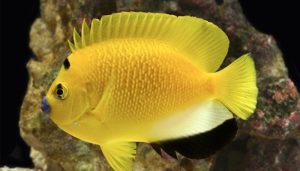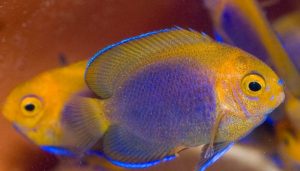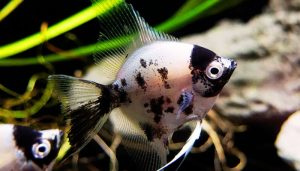If you’re passionate about guppy care, you’ve probably wondered, What are the ideal guppies water parameters to keep these vibrant swimmers healthy and happy?
Guppies are known for their resilience and beauty, but providing them with the right water conditions is essential for their well-being. By fine-tuning the parameters of your aquarium, you can create a thriving environment that mimics their natural habitat while ensuring their health and longevity.
Ready to uncover the secrets of maintaining optimal water conditions? Let’s dive in!
Guppies thrive in pH levels between 7.0 and 8.0, reflecting the slightly alkaline waters of their natural habitats.
However, commercially-bred guppies, which are more common in home aquariums, are highly adaptable. They can comfortably live in pH levels ranging from 6.0 to 9.0, giving hobbyists a flexible range to work with.
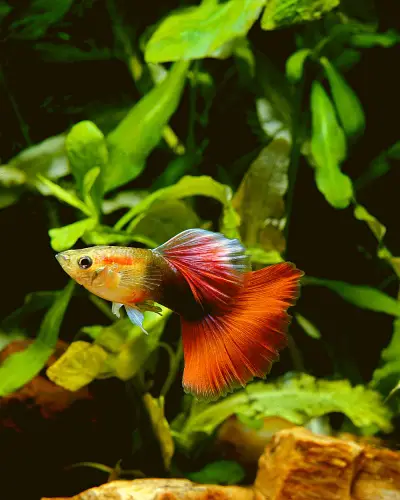
We’ll discuss the importance of water chemistry, the effects of poor water quality on your fish, and how to maintain a healthy aquarium. Whether you’re new to guppy care or an experienced aquarist, understanding and maintaining these parameters will set the foundation for a vibrant, healthy aquarium.
So, let’s dive in and discover the secrets to achieving the best guppy water parameters!
Table of Contents
ToggleAre Guppies Sensitive to Hard Water?
Are guppies sensitive to water parameters? Guppies are not overly sensitive to hard water. They can adapt to a wide range of water parameters, including both hard and soft water. 1 However, some people believe that guppies may thrive better in slightly harder water, as this can help support their fin development and overall health.
If you have hard water, you can keep guppies without any special adjustments. However, if you notice any issues with your guppies, such as fin rot or other health problems, it may be beneficial to test your water parameters and consider adding a water conditioner or buffer to slightly adjust the water chemistry.
What are the Best Water Parameters for Guppies?
The best water parameters for guppies include a stable pH level, moderate temperature, and appropriate water hardness. Guppies thrive in water with a pH between 7.0 and 8.0, as this closely resembles their natural environment.
However, commercially-bred guppies are more adaptable and can tolerate pH levels from 6.0 to 9.0, making them suitable for a variety of aquarium setups. The ideal water temperature for guppies ranges from 72°F to 82°F, as they are tropical fish that prefer warm, stable conditions.
Additionally, guppies require moderate water hardness, with levels between 8 and 12 dGH being optimal for their health and reproduction. Maintaining these parameters, alongside regular water changes and proper filtration, ensures a healthy, stress-free environment where guppies can thrive.
Understanding Water Parameters for Guppies Aquarium
Before diving into the secrets, let’s get familiar with the essential water parameters for guppies:
- Guppy Fish: Guppies are lively and colorful freshwater fish, perfect for beginners and experienced hobbyists.
- Water Change: Regular water changes are crucial to maintaining a clean and healthy aquarium environment for your guppies.
- pH Level: The pH level measures the acidity or alkalinity of water and plays a significant role in the overall well-being of your guppies.
- Guppy Tank: Designing a well-equipped and appropriately sized tank is essential for your guppies’ happiness.
- Water Hardness: Water hardness refers to the mineral content in water, which can affect the health of your guppies.
- Test Kit: A reliable water test kit is a valuable tool for monitoring and adjusting water parameters in your aquarium.
- Water Quality: Ensuring high quality is the foundation for keeping guppies thriving.
- Water pH: The water’s pH level directly influences your guppies’ overall health and behavior.
- Ideal Water Parameters: Understanding and maintaining perfect water parameters is vital for the well-being of your guppies.
- High pH: Guppies prefer slightly alkaline water, so maintaining a stable and high pH level is essential.
- Tap Water: Tap water can be used for your guppy aquarium but requires proper conditioning and adjustments.
- Water Temperature: Guppies are tropical fish, so maintaining the right fish’s water temperature is crucial for their health and vibrant colors.
The 5 Secrets to Ideal Guppies Water Parameters
1. Choosing the Right Tank and Habitat
Creating the perfect habitat for your guppies is the first step to achieving ideal water parameters. Consider these factors:
- Tank Size: The size of your aquarium depends on the number of guppies you wish to keep. As a general rule, allow a minimum of 1 gallon of water per guppy.
- Filtration System: A quality filtration system helps maintain water quality by removing debris and waste. Opt for a sponge filter suitable for the tank’s size.
- Plants and Decorations: Live plants provide guppies shelter and a natural environment. Additionally, decorations and hiding spots make them feel secure.
2. Monitoring and Adjusting pH Levels
Guppies prefer a slightly alkaline environment, with a pH range of 7.0 to 7.8. Use a reliable pH test kit to monitor the water regularly. Adjust the pH gradually using a pH buffer or conditioner if it deviates from the desired range.
3. Maintaining Proper guppy water parameters gh kh
Guppies thrive in moderately hard water with a range of 8 to 12 dGH (degrees of General Hardness). You can test water hardness for guppies with a water hardness test kit and adjust it by adding mineral supplements.
4. Regular Water Changes
Frequent partial water tank changes are essential to keep your water aquarium clean and maintain water quality. Aim for a weekly 20-30% water change to remove accumulated waste and pollutants.
5. Balancing Water Temperature
what temperature water do guppies need? Guppies are tropical fish and require a stable water tank temperature between 72°F and 82°F (22°C – 28°C). Use a reliable aquarium heater to maintain the desired temperature consistently.
What Water Is Best for Guppies?
When considering what water is best for guppies, creating an ideal environment in their aquarium is crucial. Guppies enjoy slightly alkaline water with a pH level between 7.0 and 8.0. This means that water with a high pH level is best for guppies.
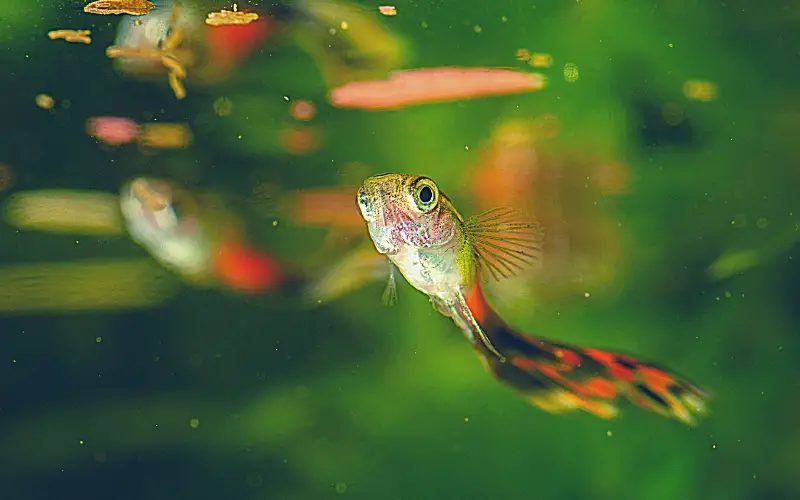
Additionally, it is crucial to consider the water hardness. Guppies prefer moderately complex water, so proper water hardness is essential. Fancy guppies, which are more delicate, may require even softer water.
To keep the water suitable for guppies, regular water testing is necessary. This will ensure that the pH and water hardness are optimal for the guppies’ health and well-being. Ultimately, guppy owners can provide a comfortable and thriving environment for these beautiful fish by offering the best guppy water conditions.
Can You Use Tap Water for Guppies?
Using tap water for guppies can be suitable, but it’s essential to consider a few factors to ensure the water is safe for them:
- Chlorine and Chloramines: Tap water often contains chlorine and chloramines, which are harmful to fish. You can remove chlorine by letting the water sit for 24 hours or by using a water conditioner that neutralizes chlorine and chloramines.
- pH Levels: Guppies prefer slightly alkaline water with a pH between 7.0 and 7.8. Test your tap water’s pH and adjust it if necessary using pH buffers.
- Hardness: Guppies thrive in moderately hard water with a general hardness (GH) level between 8-12 dGH and carbonate hardness (KH) level between 5-15 dKH. Test your water’s hardness and adjust if needed.
- Temperature: Ensure that the tap water temperature matches the temperature of the aquarium water to avoid shocking the fish.
- Toxins: Tap water may contain other toxins like heavy metals, which can be harmful to guppies. Using a good water conditioner can help neutralize these toxins.
- Regular Water Changes: Regardless of the water source, regular partial water changes are essential for maintaining good water quality in the aquarium.
In summary, tap water can be used for guppies, but it requires proper conditioning to ensure it is safe and suitable for them. Testing the water parameters and using appropriate water conditioners are crucial steps to take before adding tap water to a guppy tank.
Why Are My Guppy Fish Dying?
If your guppy fish are dying, there could be several reasons for this unfortunate occurrence.
One possible explanation is that the guppies you purchased from the pet store already carry diseases or parasites. It is crucial to source your guppies from a reputable store to ensure their health and well-being.
Another factor to consider is the aquarium’s condition and the guppy tank’s water parameters. Poor water quality, such as high ammonia or nitrate levels, can be lethal to guppy fish.
Maintenance and changing the water of the aquarium are vital to creating a healthy environment for your guppies. Additionally, overcrowding the community tank can also lead to stress and disease, so provide enough space for your guppies to thrive.
Experts suggest having at least two female guppies for every male guppy in a tank. This is because male guppies can be aggressive towards females if outnumbered, often chasing them around relentlessly. By maintaining a balanced male to female ratio, the females can have some respite from the constant attention of the males.
What Water Parameters Are Best for Guppy Tank?
Water parameters play a crucial role in the health and well-being of guppies. Guppies, also known as fancy guppies or million fish, are tropical fish that originate from South America.
The best water parameters for guppies include a temperature range between 72-82°F (22-28°C) and a pH level of 6.8-7.8. Guppies require clean and well-filtered water with low ammonia and nitrite levels, as these can harm their delicate respiratory systems.
They maintain appropriate hardness levels in the tank water, with a recommended range of 8-12 dGH (degrees of general hardness). Other important water parameters for guppies include proper levels of dissolved oxygen and nitrates. Regular water testing and monitoring of these parameters are vital for maintaining a thriving guppy aquarium.
How Can You Measure pH Levels In A Fish Tank?
You can use a test kit specifically designed to measure pH levels in a fish tank. First, ensure the fish tank and aquarium water are clean and debris-free. Then, fill a test tube with a water sample from the tank.
Add a few drops of the provided pH indicator solution into the test tube and gently mix it with the water. The indicator solution will change the color of the water based on the pH level. Compare the color of the water tank in the test tube to the provided color chart that comes with the test kit.
This will give you an accurate measurement of the pH level in your tank. It is significant to regularly test the pH levels in your fish tank, as fluctuations can harm fish, susceptible species like guppies.
If the pH level is not within the appropriate range for guppies, you may need to adjust it by adding proper water to change the pH level. It is always advisable to seek advice from a pet store or aquarium experts for appropriate guidance.
Commonly Asked Questions about Ideal water parameters for Guppies (FAQs)
How often should I test my aquarium water parameters?
Test your aquarium water parameters at least once a week for optimal results.
Can I use distilled water for my guppies?
Distilled water lacks essential minerals and is not suitable for guppies. Use tap water treated with a water conditioner instead.
How many guppies can I keep in a 10-gallon tank?
A 10-gallon tank can comfortably accommodate 5-6 adult guppies.
Should I acclimate my guppies to new water during water changes?
Acclimate your guppies by floating their bag or container in the tank for 15-20 minutes to adjust to the water temperature.
Can I keep other fish as tank mates for guppies?
Guppies are friendly and can coexist with peaceful community fish like mollies, platies, and neon tetras.
How do I maintain the ideal water temperature in my guppy tank?
You can use a reliable water heater specifically designed for aquarium use to maintain the ideal water temperature in your guppy tank. Set the heater to the desired temperature range for guppies and monitor it regularly.
What is the recommended pH level for guppies?
What ph do guppies like? The recommended guppy pH level is between 6.8 and 7.8. Maintaining stable pH levels is crucial to ensure your guppies’ well-being.
Can guppies live with other fish species?
Yes, Poecilia wingei guppies can live with other peaceful fish species as long as the tank mates are not aggressive and do not tend to nip at the guppies’ fins. Some suitable guppies tank mates include neon tetras, platies, mollies, and swordtails.
How often should I change the water in my guppy tank?
It is recommended to perform regular weekly water changes of around 20-25% to maintain optimal water quality for your guppies. Frequent water changes help remove accumulated toxins and maintain the overall health of your guppies.
How do I test the water parameters in my guppy tank?
You can test the water parameters in your guppy tank using a water testing kit designed for aquarium use. Follow the instructions given with the kit to test the pH, ammonia, nitrite, and nitrate levels in your tank’s water.
How can I help my guppy breed successfully?
To help your guppy breed successfully, if you want to breed guppies, you can provide a separate breeding tank with suitable hiding spots and plants for the female guppies. Maintain optimal guppy water parameters feed them a nutritious diet, and ensure a stress-free environment for breeding guppy fish.
Are guppies picky eaters?
No, guppies are not picky eaters. They are omnivorous and will readily consume various types of food, including flakes, pellets, freeze-dried and live foods. However, providing a balanced diet to meet their nutritional needs is essential.
How often should I feed my guppies?
Feeding your guppies 2-3 small meals throughout the day is recommended. Avoid overfeeding, as it might lead to health issues and poor water quality in the tank.
What is the water hardness level (KH) required for guppies?
The water hardness level (KH) required for guppies is 4 to 8 dKH. Adequate water hardness helps support their physiological functions and overall well-being.
Conclusion
In conclusion, achieving and maintaining ideal guppies water parameters is crucial to being a responsible fish owner. By following these expert care for guppies tips and advice outlined in this post, you can ensure that your guppies live in a healthy and thriving environment. Remember to test your water regularly, adjust as needed, and provide your fish with a clean and healthy living space. With a little effort and dedication, you can create a beautiful aquarium that your guppies will love. Maintaining ideal endler guppy water parameters can be challenging but achievable with the proper knowledge and tools.
By prioritizing your fish’s health and well-being, you give them the best chance for a long and happy life. So start implementing these simple tips, and enjoy watching your guppies thrive in their optimal environment!
You might also like
- How Long Can Guppies Survive Without Air Pump? (Solved)
- Raising Guppies in Outdoor Pond: A Comprehensive Beginner’s Guide!
- Are Guppies Hardy Fish: 5 Shocking Health Risks Revealed!
- Are Saltwater Guppies or Freshwater: 5 Easy Steps to Thriving Tank!
- What Do Guppies Like in Their Tank: 7 Things Guppies LOVE
- My Water Tests Perfect but My Fish Keep Dying (Solved)
- Guppy Breeding Tank Size – Structure Your Guppies Tank in Just 6 Steps
- Do Guppies Sleep At Night: The Truth Will Amaze You!
- Best Water Temperature for Guppies Breeding Success!
- Can Guppies Eat Goldfish Flakes: Top 7 Best Foods For Guppies!
- What Plants Do Guppies Eat: 7 Best Live Plants for Guppies Tank!
- Why Are My Guppies Dying: (5 Major Causes & Best Solutions)
- Neon Tetra with Guppies: 3 Secrets to the Ultimate Harmony!


